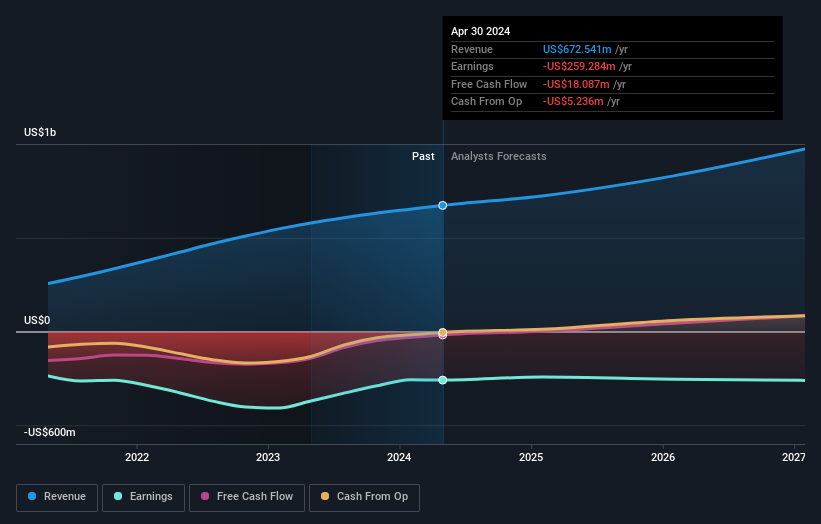With 63% ownership in Asana, Inc. (NYSE:ASAN), insiders continue to have the largest holding even though they have sold shares recently
Key Insights
Insiders appear to have a vested interest in Asana's growth, as seen by their sizeable ownership
Dustin Moskovitz owns 53% of the company
If you want to know who really controls Asana, Inc. (NYSE:ASAN), then you'll have to look at the makeup of its share registry. The group holding the most number of shares in the company, around 63% to be precise, is individual insiders. Put another way, the group faces the maximum upside potential (or downside risk).
Even though insiders have sold shares recently, the group owns the most numbers of shares in the company.
Let's take a closer look to see what the different types of shareholders can tell us about Asana.
View our latest analysis for Asana
What Does The Institutional Ownership Tell Us About Asana?
Many institutions measure their performance against an index that approximates the local market. So they usually pay more attention to companies that are included in major indices.
We can see that Asana does have institutional investors; and they hold a good portion of the company's stock. This can indicate that the company has a certain degree of credibility in the investment community. However, it is best to be wary of relying on the supposed validation that comes with institutional investors. They too, get it wrong sometimes. If multiple institutions change their view on a stock at the same time, you could see the share price drop fast. It's therefore worth looking at Asana's earnings history below. Of course, the future is what really matters.
Asana is not owned by hedge funds. The company's CEO Dustin Moskovitz is the largest shareholder with 53% of shares outstanding. This implies that they possess majority interests and have significant control over the company. Investors usually consider it a good sign when the company leadership has such a significant stake, as this is widely perceived to increase the chance that the management will act in the best interests of the company. Justin Rosenstein is the second largest shareholder owning 9.1% of common stock, and Voya Investment Management LLC holds about 5.1% of the company stock. Interestingly, the second-largest shareholder, Justin Rosenstein is also Top Key Executive, again, pointing towards strong insider ownership amongst the company's top shareholders.
While studying institutional ownership for a company can add value to your research, it is also a good practice to research analyst recommendations to get a deeper understand of a stock's expected performance. Quite a few analysts cover the stock, so you could look into forecast growth quite easily.
Insider Ownership Of Asana
The definition of company insiders can be subjective and does vary between jurisdictions. Our data reflects individual insiders, capturing board members at the very least. Company management run the business, but the CEO will answer to the board, even if he or she is a member of it.
Most consider insider ownership a positive because it can indicate the board is well aligned with other shareholders. However, on some occasions too much power is concentrated within this group.
Our most recent data indicates that insiders own the majority of Asana, Inc.. This means they can collectively make decisions for the company. That means insiders have a very meaningful US$1.9b stake in this US$3.1b business. Most would argue this is a positive, showing strong alignment with shareholders. You can click here to see if they have been selling down their stake.
General Public Ownership
The general public, who are usually individual investors, hold a 11% stake in Asana. While this size of ownership may not be enough to sway a policy decision in their favour, they can still make a collective impact on company policies.
Next Steps:
It's always worth thinking about the different groups who own shares in a company. But to understand Asana better, we need to consider many other factors. To that end, you should be aware of the 3 warning signs we've spotted with Asana .
Ultimately the future is most important. You can access this free report on analyst forecasts for the company.
NB: Figures in this article are calculated using data from the last twelve months, which refer to the 12-month period ending on the last date of the month the financial statement is dated. This may not be consistent with full year annual report figures.
Have feedback on this article? Concerned about the content? Get in touch with us directly. Alternatively, email editorial-team (at) simplywallst.com.
This article by Simply Wall St is general in nature. We provide commentary based on historical data and analyst forecasts only using an unbiased methodology and our articles are not intended to be financial advice. It does not constitute a recommendation to buy or sell any stock, and does not take account of your objectives, or your financial situation. We aim to bring you long-term focused analysis driven by fundamental data. Note that our analysis may not factor in the latest price-sensitive company announcements or qualitative material. Simply Wall St has no position in any stocks mentioned.

 Yahoo Finance
Yahoo Finance 

